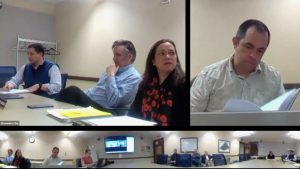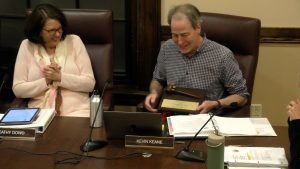Aired October 13, 2022. The town of Needham seeks authorization at the Special Town Meeting on October 24, 2022 to contract with a renewable energy supplier to reduce greenhouse gas emissions and potentially lower the cost of electricity.
reported by Yuxiao Yuan
At the beginning of this year, the town of Needham charged the Climate Action Plan Committee with recommending actions that can help reduce the town’s greenhouse gas emissions. Their first recommendation is up for vote at the Special Town Meeting on October 24th. If warrant Article 14 passes, the town will be authorized to purchase electricity that is generated by a cleaner energy provider on behalf of the residents and businesses. First let’s take a look at your electric bill. You will see there are a lot of charges, but all of those line items are grouped into two categories: Supply and Delivery. Massachusetts residents have no choice when it comes to selecting the local utility company who delivers electricity to their homes through the power lines, and posts it owns and operates. In Needham, Eversource is the electricity delivery company. Residents do have a choice about the electricity supplier. But unless they shop around on their own, Eversource is the default supplier. Now why would a resident want a different supplier? Two reasons: green energy and a favorable price. Stephen Frail, chair of the Needham Climate Action Plan Committee explains.”When the electricity is generated, it’s generated often from fossil fuels like natural gas or coal. Currently the state requires just 20 percent of our electricity to be generated from Class One Renewables, like wind and solar.” Electricity supplied by Eversource only meets the minimum 20 percent renewable energy requirements. If a resident wants to choose use a provider using more renewable energy, the price is usually higher than the Eversource standard rate. But if a town or city aggregates its residents and businesses and buys power on their behalf, a practice often referred to as “Community Electricity Aggregation” or CEA, residents might be able to have a cheaper option. “They do this by pooling the purchasing power of small consumers of electricity like residential homes and small businesses that on their own can’t go out and negotiate. And so the pooling purchasing power will hopefully allow us to get greener electricity at a better rate.” As a member of the local environment advocacy group, Green Needham, Stephen Frail took steps to reduce his carbon footprint at home, including switching to a cleaner electric supply. “Before that, we’d put solar panels on the roof, and so that it was a question of, yes, during the day we’re getting some energy from the panels, but at night we’re getting it from the grid, and the grid is not that clean. So we wanted to clean up that aspect of our electricity supply, as well. We’ve also switched our natural gas stove out for an induction stove, and we now drive electric vehicles primarily.” Frail was appointed by the Select Board as the chair of the Climate Action Plan Committee this year. He and his colleagues first took a look at the components of Needham’s greenhouse gas emissions, and found about a quarter of the emissions comes from electricity. “The community electricity aggregation has one of the largest impacts that we can achieve in the short term–the biggest bang for the buck for for the town.” In Massachusetts there are over 170 cities and towns that currently have a CEA in place. A typical CEA program includes three or four tiers, representing different amounts of renewable energy. “So there might be the base rate, there might be a rate with about five percent, ten percent more renewable energy, and then often there’s an opt-in higher rate, so that might be 50 or 60 percent renewable energy. So each town does this differently, but what they get back is a bid from energy suppliers for each of the mixes of renewable energy that would be available.” The town or city chooses a default option for its participating residents and businesses, who can also choose a different tier or opt out of the program and return to Eversource supply at any time without penalties. Participants will still get one single bill from Eversource, who will continue to deliver the electricity, while the supply rate on the bill will reflect the aggregation rate. Take Newton, for example. It has three tiers. The basic 20% renewable charges 10.65 cents per kilowatt hour. The 82% renewable tier charges 13.45 cents, which is the default rate that new residents are automatically assigned to. The 100% renewable energy tier charges 14.36 cents. The current Eversource rate is 17.87 cents. It will likely take over a year for Needham to finalize its aggregation plan, but getting permission from town meeting is the first step. “What the warrant article does, is it just authorizes the town to begin working with a consultant to investigate a CEA, so the town would begin the process. It would define what it’s looking for in a energy provider. It would invite public comment, so that’s a very important part of the process. There’s also a state approval process for the plan. We can’t do anything without this warrant passing.” You can go to the 2022 October Town Meeting section on the town website for more information about how a CEA works.











More Stories
Walk in their Historical Shoes
2025 Annual Town Election Results
Boys Volleyball vs Newton North, 4/8/25